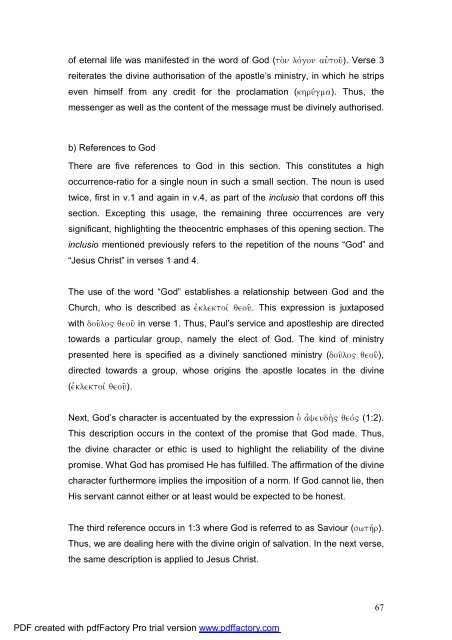A Text centred rhetorical analysis of Paul's Letter to Titus
A Text centred rhetorical analysis of Paul's Letter to Titus
A Text centred rhetorical analysis of Paul's Letter to Titus
Create successful ePaper yourself
Turn your PDF publications into a flip-book with our unique Google optimized e-Paper software.
<strong>of</strong> eternal life was manifested in the word <strong>of</strong> God (<strong>to</strong>;n lovgon auj<strong>to</strong>u'). Verse 3<br />
reiterates the divine authorisation <strong>of</strong> the apostle’s ministry, in which he strips<br />
even himself from any credit for the proclamation (khruvgma). Thus, the<br />
messenger as well as the content <strong>of</strong> the message must be divinely authorised.<br />
b) References <strong>to</strong> God<br />
There are five references <strong>to</strong> God in this section. This constitutes a high<br />
occurrence-ratio for a single noun in such a small section. The noun is used<br />
twice, first in v.1 and again in v.4, as part <strong>of</strong> the inclusio that cordons <strong>of</strong>f this<br />
section. Excepting this usage, the remaining three occurrences are very<br />
significant, highlighting the theocentric emphases <strong>of</strong> this opening section. The<br />
inclusio mentioned previously refers <strong>to</strong> the repetition <strong>of</strong> the nouns “God” and<br />
“Jesus Christ” in verses 1 and 4.<br />
The use <strong>of</strong> the word “God” establishes a relationship between God and the<br />
Church, who is described as ejklek<strong>to</strong>iv qeou'. This expression is juxtaposed<br />
with dou`lo" qeou' in verse 1. Thus, Paul’s service and apostleship are directed<br />
<strong>to</strong>wards a particular group, namely the elect <strong>of</strong> God. The kind <strong>of</strong> ministry<br />
presented here is specified as a divinely sanctioned ministry (dou`lo" qeou'),<br />
directed <strong>to</strong>wards a group, whose origins the apostle locates in the divine<br />
(ejklek<strong>to</strong>iv qeou').<br />
Next, God’s character is accentuated by the expression oJ ajyeudh;" qeov" (1:2).<br />
This description occurs in the context <strong>of</strong> the promise that God made. Thus,<br />
the divine character or ethic is used <strong>to</strong> highlight the reliability <strong>of</strong> the divine<br />
promise. What God has promised He has fulfilled. The affirmation <strong>of</strong> the divine<br />
character furthermore implies the imposition <strong>of</strong> a norm. If God cannot lie, then<br />
His servant cannot either or at least would be expected <strong>to</strong> be honest.<br />
The third reference occurs in 1:3 where God is referred <strong>to</strong> as Saviour (swthvr).<br />
Thus, we are dealing here with the divine origin <strong>of</strong> salvation. In the next verse,<br />
the same description is applied <strong>to</strong> Jesus Christ.<br />
PDF created with pdfFac<strong>to</strong>ry Pro trial version www.pdffac<strong>to</strong>ry.com<br />
67

















